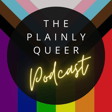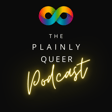
Special Guest Chris Sheridan - The Queer Therapist
On this episode of The Plainly Queer Podcast, we welcome Chris Sheridan a trans, masc, non-binary, neurodivergent psychotherapist. Chris specialises in gender, sexual and relationship diversity therapy and is the founder of The Queer Therapist, a UK online therapy service. They provides affirming therapy for GSRD and neurodivergent individuals and also serve as the lead psychotherapist and expert advisor for Voda, the LGBTQIA mental health app.
In the episode, we discuss the trans and non-binary experience from Chris’s unique lived perspective. We examine the current trends of transphobia against the backdrop of historical genocide and discuss how we can learn from the past to help us navigate towards a more inclusive future. Intersectionality and the sexy sounding concept of Neurospicy are also explored from a plainly Queer perspective.
You can learn more about Chris through their website at https://thequeertherapist.com/ or their Instagram at https://www.instagram.com/theqtherapist/
Below are some of the resources mentioned in the episode:
The Voda App: https://www.voda.co/
The Wheel of Power and Privilege: https://kb.wisc.edu/instructional-resources/page.php?id=119380
The Right is Laying the Foundation for Genocide article: https://www.theslateonline.com/article/2022/11/the-right-is-laying-the-foundation-for-genocide
Thank you for being part of our Plainly Queer community. We hope you enjoy this episode. Please note that it discusses potentially distressing topics, so engage mindfully and seek professional help if needed.
Here is a list of resources that may be of help to anyone listening:
Queer affirming counselling and psychotherapy services: https://www.insightmatters.ie/ and https://thequeertherapist.com
LGBTQ+ community support in Ireland: https://lgbt.ie/
LGBTQ+ Youth Support in Ireland: https://www.belongto.org/
Transgender Equality Network Ireland: https://teni.ie/
The Samaritans: https://www.samaritans.org/ireland/samaritans-ireland/


